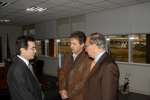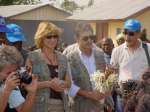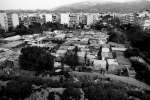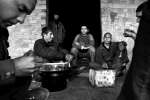European Commission and UNHCR launch scheme to provide 20,000 reception places for asylum seekers in Greece
Press Releases, 14 December 2015
European Commission – Press release
Athens, 14 December 2015
The European Commission and the UNHCR today launched a scheme to provide 20,000 additional reception places for asylum seekers and relocation candidates in Greece through subsidies for housing in the private sector. The Commission is providing €80 million from the 2016 EU budget. This declaration helps to deliver on a commitment made by Greece and the UNHCR during the Western Balkans Leaders' Meeting on 25 October 2015.
Vice-President Kristalina Georgieva, responsible for Budget and Human Resources, signed the declaration on behalf of the European Commission, together with Mr George Okoth-Obbo, UNHCR Assistant High Commissioner for Operations, and Mr Ioannis Mouzalas, Alternate Minister of Interior and Administrative Reconstruction of Greece.
Vice-President Georgieva said: "Today we stand in solidarity with Greece and with children, women and men seeking refuge in Europe. The scheme we are launching offers EU budgetary support for families, notably providing them with adequate shelter. While today's declaration is about temporary assistance, the Commission continues to use the full range of tools at our disposal to find a long-term solution to the refugee crisis in Europe."
UNHCR Assistant High Commissioner Okoth-Obbo added: "Since the adoption of the European Agenda on Migration in May, the European Commission has taken a number of key actions to address the current emergency. Today, we put in place together the conditions to provide vital assistance and accommodation through 20,000 reception places. The swift implementation of the hotspots approach and the acceleration of the relocation pace are now the priorities, but the whole scheme can be successful only if it is accompanied by large scale emergency reception, assistance and registration efforts in the countries most impacted by arrivals."
Under this declaration, the Commission is providing funding from the EU budget for the UNHCR to support Greece in developing its asylum reception capacity. The UNHCR will provide for 20,000 reception places through rent subsidies and host family programmes. The places provided under this scheme are an important part of the EU emergency relocation scheme, providing temporary accommodation in Greece for applicants who are awaiting relocation to other EU Member States.
The UNHCR has already supported the Greek Government in the improvement of existing facilities on some of its islands. While the construction works at the hotspots are undertaken by the Greek authorities, under this declaration the UNHCR would also support the establishment of the hotspots through advice by UNHCR staff, acquisition of supplies and construction works as necessary.
The total funding for the refugee crisis from the EU budget in 2015 and 2016 amounts to €10 billion. The costs for this programme in 2016 are part of over €4 billion allocated from the EU budget for addressing the refugee crisis in EU Member States and tackling the root causes in countries of origin and transit.
Background
Greece is one of the Member States most impacted by the unprecedented refugee crisis facing Europe. More than 750,000 third country nationals have arrived in Greece in 2015.
The hotspot system and emergency relocation schemes were proposed by the Commission in the European Agenda on Migration presented in May 2015. The schemes provided for a total of 160,000 people in need of international protection to be relocated from Greece and Italy to other Member States to have their applications treated. The majority of these people should be received in hotspot locations, where EU agencies are providing support to national authorities with registration and processing of applications.
European Commission President Jean-Claude Juncker called a Leaders' Meeting on 25 October to address refugee flows along the Western Balkans route and respond to the emergency situation unfolding in the affected countries. The Heads of State or Government of Albania, Austria, Bulgaria, Croatia, the former Yugoslav Republic of Macedonia, Germany, Greece, Hungary, Romania, Serbia and Slovenia took part in the meeting, as well as the Presidents of the European Parliament, European Council and European Commission, the UNHCR and the competent EU agencies.
The meeting concluded with a Joint Leaders Statement, which included a commitment to improve information exchange and coordination between the countries on the route to achieve the gradual, controlled and orderly movement of persons. Leaders also agreed to provide an additional 50,000 reception places for asylum seekers along the Western Balkans route, and 50,000 reception places in Greece, including 20,000 places to be provided through a joint scheme with the UNHCR.
Press contacts (European Commission):
- Natasha BERTAUD (+32 2 296 74 56)
- Tim McPHIE (+32 2 295 86 02)
- Andreana STANKOVA (+32 2 295 78 57)




















































